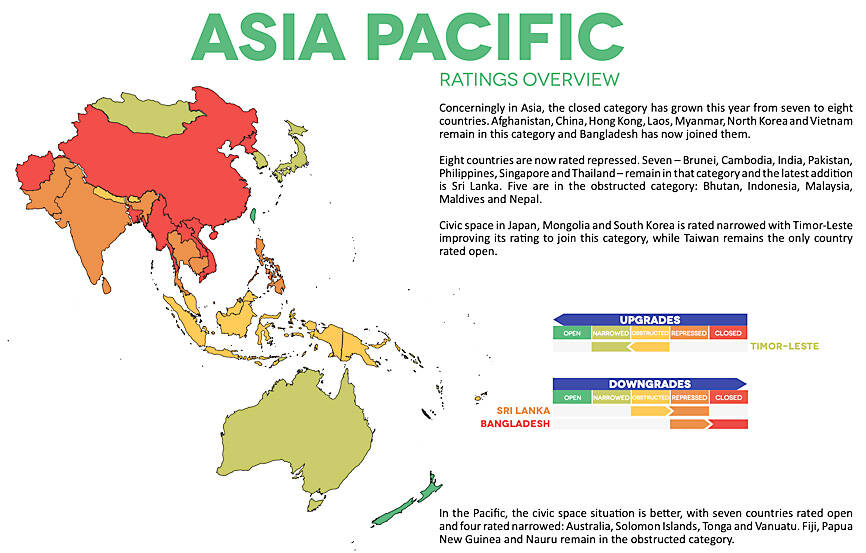Taiwan remains the only country in Asia with an “open” civic space for the fifth consecutive year, the Civicus Monitor said in a report released yesterday.
The People Power Under Attack 2023 report named Taiwan as one of only 37 open countries or territories out of 198 globally, and the only one in Asia.
Compiled by Civicus — a global alliance of civil society organizations dedicated to bolstering civil action — the ranking compiled annually since 2017 measures the state of freedom of association, peaceful assembly and expression around the world.

A page from the Civicus Monitor report People Power Under Attack 2023 shows the state of civil society in the Asia-Pacific region.
Photo courtesy of Civicus Monitor
Researchers assign each country or territory one of five rankings describing the state of its civic space as open, narrowed, obstructed, repressed or closed.
This year, 37 were considered open, 43 were narrowed, 40 were obstructed, 50 were repressed and 28 were closed.
By population, only 2.1 percent of people live in open societies — half the percentage reported six years ago — while 40.3 percent are in repressed societies and 30.6 percent are in closed societies.
Eight of the 26 countries or territories in Asia were rated as closed, up from seven last year, as Bangladesh joined China, Hong Kong, North Korea, Vietnam, Laos, Myanmar and Afghanistan in the bottom ranking.
Citing Reporters Without Borders data, Civicus said that Taiwan ranked 35th globally for press freedom and the government generally respects those freedoms.
Taiwan has a rich media environment, and the government respects and upholds its people’s liberties and rights of assembly, allowing the public to protest without undue limitations, the report said.
In contrast, Bangladesh launched a sweeping and violent crackdown on opposition parties ahead of general elections, arresting nearly 10,000 activists, and has been downgraded to the lowest rank.
Sri Lanka has also been downgraded to repressed after it continued to crack down on dissidents and activists.
Josef Benedict, a Civicus researcher covering the Asia-Pacific region, said that with the civic space in the region continuing to shrink, Taiwan maintaining an open civic space is positive, as it shows that human rights and civic space development in the region are not all bad, and that some nations are still serious about their international responsibilities.
Taiwan has become a haven for journalists and dissidents from other nations, allowing them to continue their work safely, he added.
Countries that want to develop their civic spaces should look to Taiwan to learn from it, he said.
However, Taiwan has room for improvement, Benedict said, adding that the defamation laws under Article 310 of the Criminal Code could be used to oppress freedom of speech.
While there is freedom to form unions in Taiwan, the nation also has strict rules against strikes, he said.
Source: Taipei Times - 2023/12/07




















